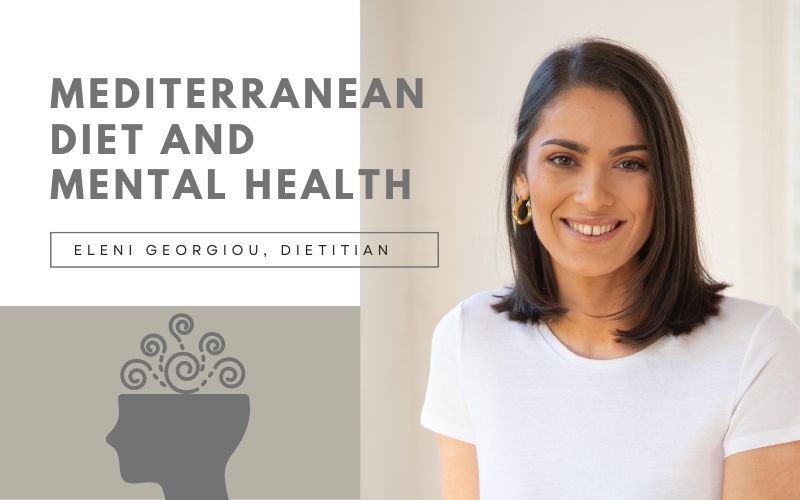
We know that diet impacts our physical health, but did you know that what we eat can also impact our mental health? There is increasing research into this area, and much evidence to support the idea that a good diet can have a positive impact on our mental health. Not only for our stamina and energy levels, but memory, cognitive function, and sleep. There has been considerable research on the Mediterranean Diet and mental health in particular. Perhaps because it’s currently considered one of the healthiest dietary models out there. It’s easy to follow, and high in plant-based, whole foods. As well, it is also high in components such as omega 3’s and polyphenols, which may help our mental health, and may have particular benefit for depression.
So, what research has occurred around the Mediterranean diet and mental health? And what are some of our recommendations when it comes to eating for good mental health? Read the article below, and check out my video with plenty of tips, all about this fascinating area of nutrition.

The Mediterranean Diet and mental health research
A significant trial relating to the Mediterranean diet and mental health is the SMILES trial, (2018). This was preliminary research out of Melbourne, seeking to understand the possible therapeutic impact of dietary changes on existing mental illness. SMILES is an acronym for Supporting the Modification of Lifestyle in Lowered Emotional States. The diet chosen for the research was a modified Mediterranean diet model.
The trial looked to answer the question: If I improve my diet, will I improve my mental health?
Details
67 participants who were experiencing depression, were split into two groups and enrolled in consulting sessions for 12 weeks. Participants were chosen based on their reports of poor (low) intake of dietary fibre, lean proteins and fruit and vegetables, and a high intake of sweets, processed meats and salty snacks.
Researchers provided each of the 33 participants in the dietary group with seven one-on-one nutritional consulting sessions, delivered by a clinical dietitian. The 12-week structured dietary support focused on improving diet quality using a modified Mediterranean diet model. The remaining 34 participants in the control group were provided with a social support protocol matching the same visit schedule and length. The second group were not engaging in any particular techniques of psychotherapy, but rather, a ‘befriending’ model often used as a control in other psychotherapy trials.
Results
At the end of 12 weeks, participants were assessed primarily for symptoms of depression using a formal rating MADR scale (Montgomery-Asberg Depression Rating Scale). As well as other outcomes such as remission, change of symptoms, mood, and anxiety. The dietary support group demonstrated significantly greater improvement in MADRS scores between baseline and 12 weeks than the social support control group. Results found a staggering 32% remission rate in those with depression in the food group. The findings were important in directing further research and treatment for mental health.
Watch my video and continue reading below as I talk about the SMILES trial, the benefits of the Mediterranean diet and ways you can optimise diet for mental health.
What are the beneficial properties of the Mediterranean diet for mental health?
Some of the key components of the Mediterranean diet include nuts and seeds, herbs, and spices, as well as oily fish. These types of foods contain really good amounts of tryptophan, selenium, and vitamin D. Those nutrients play a massive role in sleep health. As we all know, poor or inadequate sleep can negatively impact our mental health and what that next day looks like.
The other significant component of the Mediterranean Diet is the high levels of polyphenols. These are compounds found naturally in plant foods such as fruits and vegetables. But also, in herbs and spices, tea, extra-virgin olive oil, dark chocolate and wine. Polyphenol-rich foods are packed with antioxidants, which help to neutralise free radicals which can damage cells. Polyphenols are also thought to reduce inflammation and have also been associated with a decreased risk of depressive symptoms. Incorporating this Mediterranean-style food into your daily or weekly diet may be beneficial.
The diet is also abundant in Omega-3 fats found in extra virgin olive oil and oily fish, which can also improve mental health and brain function. The diet also naturally has higher proportions of fish than we might see in a typical Western diet.
What can you do to focus on your mental health from a diet perspective?
1. Swap unhealthy refined snacks with healthier versions.
Instead of reaching for packaged sugary or sweet snacks, consider opting for whole foods. Snack on fruit, nuts and seeds, whole grain crackers, legumes, and lentils. For a packaged alternative, try something like The Happy Snack Company’s roasted chickpeas for a nutrition option on the go. Instead of salty crisps, pizza or cured meats, the Med diet has olives and feta cheese. Both foods provide that salty taste but are much healthier. They are also both fermented foods, which are great for good gut health. (Note, fermented foods can be contraindicated with some anti-depressants, so please check with your doctor if you are taking them).
2. Increase fish meals and reduce red meat.
Aim for at least three serves of fish per week. Fish is high in omega-3 fats, which has been shown to have a positive effect on mental health. Increase your intake of oily fish such as tuna, salmon, mackerel, sardines, and herring. The Mediterranean diet has a host of wonderful fish recipes to help you get more into your weekly diet. With red meat, aim to eat it less often and opt for lean sources.
3. Swap out refined sugars and increase carb quality.
If you’re looking for something sweet, swap refined sugars for natural sugars. Swapping packaged snacks, cakes, and biscuits for fresh fruit. And sweetened with honey, rather than sugar. These are naturally occurring sugars. Aim for carbohydrate sources that provide a slow release of carbohydrates into the blood sugar. The quicker the process is, through refined carbs, the less sustainable energy provided to you. Low GI foods also typically contain more fibre. Try swapping white bread to brown bread, rice crackers for whole grain crackers, white rice for brown rice or basmati rice. Dried fruit for fresh fruit. We want the body to have a bit of work to do, giving you that slower release of energy across the day. Better carbs allow you to hover over that sustainable energy rather than experiencing the ups and downs of spikes in blood sugar. Refined sugars can give us a rollercoaster of emotions and appetite.
So, a couple of extra tips and tricks on top of the Mediterranean diet principles you’re all following, and this time you’re reaping the rewards from the mental health side of things on top of the physical health. If you’re curious about the Mediterranean Diet, download our free Mediterranean Diet recipes.
Want to talk to a dietitian?
We specialise in mental health nutrition and the Mediterranean Diet. Find out how we can help support you with nutritional solutions and strategies for your well-being.
DISCLAIMER:
The content on this page is not intended as medical advice. It is also of a general nature and is not tailored to your individual circumstances. We encourage you to seek professional help and support if you are experiencing mental ill-health.
24/7 mental health support
If talking about mental health raises issues for you, please know that help is available. Reach out to the following free services for support 24 hours a day, 7 days a week.
- Lifeline
Counselling for anyone, anytime. Phone 13 11 14 - Beyond Blue
Information and referral for depression and anxiety. Phone 1300 224 636
